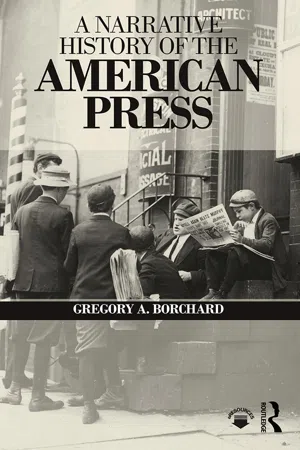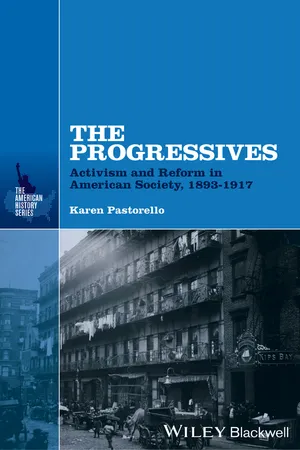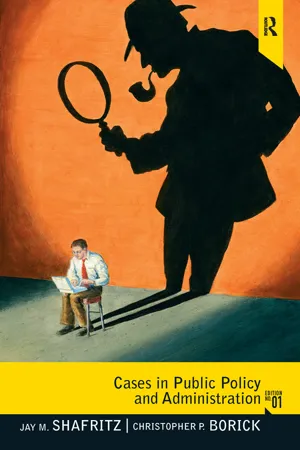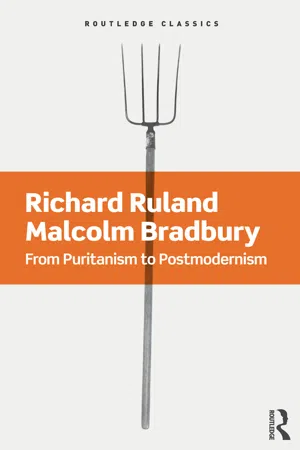History
Muckrakers
Muckrakers were investigative journalists and writers in the late 19th and early 20th centuries who exposed social and political corruption, as well as injustices in society. They played a significant role in raising public awareness about issues such as child labor, unsafe working conditions, and political corruption, ultimately contributing to the progressive reform movement in the United States.
Written by Perlego with AI-assistance
Related key terms
4 Key excerpts on "Muckrakers"
- eBook - ePub
- Gregory A. Borchard(Author)
- 2018(Publication Date)
- Routledge(Publisher)
Chapter 8 , contributed to a unique era of change. (While muckraking can be understood as a reporting technique, yellow journalism, which essentially placed style over substance, can be seen as a publishing technique to increase sales.)And while the definition of muckraking would evolve into a somewhat fluid description of investigative reporting in general, a few representative writers and reporters who fit the description established by Roosevelt can illustrate, for the purposes of this chapter, what muckraking did. While the journalists featured in this chapter do not encompass the entire muckraking movement, they do supply a sample that supplies a snapshot of their work.The Making of a Movement
To remedy society’s ills, the Muckrakers advocated in their writings the redistribution of wealth. Muckraking had its golden years in the first decade of the twentieth century, but writers practiced this style of reporting well before then. For example, Ida B. Wells, in at least a few respects, had practiced muckraking, although she did so on different terms than the most prominent writers associated with the movement—while Wells focused on racial justice, more commonly the Muckrakers focused on economic issues.Another defining element of the movement included its reliance on popular magazines (not newspapers alone) to advance the agenda of social reform. These magazines set the trend for prominent issues by featuring extensive reports accompanied by elaborate color graphics and entertaining articles on a wide range of topics, with McClure’s, as a leading muckraker magazine, leading the way, and Cosmopolitan— - eBook - ePub
The Progressives
Activism and Reform in American Society, 1893 - 1917
- (Author)
- 2013(Publication Date)
- Wiley-Blackwell(Publisher)
For a historical moment, investigative journalists and photographers, otherwise known as Muckrakers, seemed to personify Progressivism in its early stage. Hoping that their exposés would effect social change, in addition to probing greed and corruption in businesses and government, the Muckrakers investigated many issues related to life in urban areas, including child labor, inhumane prison conditions, systems of justice, prostitution, women's inequality, the drug trade, the tax system, the insurance industry, exploitation of natural resources, and beef, oil, and tobacco trusts. Muckrakers' shocking photographs and scathing accounts in books, as well as in newspapers and magazines informed middle- and upper-class readers who otherwise had little knowledge of the problems associated with industrialization. Ultimately, these journalists and photographers, men as well as women, wielded an enormous amount of influence on policy makers and legislators.It was none other than Theodore Roosevelt who inadvertently coined the term muckraker during a 1906 speech at the dedication of a new congressional office building when he likened this new breed of journalists to the pilgrim in Puritan writer John Bunyan's seventeenth-century classic Pilgrim's Progress. Roosevelt observed that there were some journalists who raked the muck from earth always looking down, therefore rejecting a celestial crown. Roosevelt agreed that Muckrakers helped to advance Progressive causes, but he also believed that they sometimes went too far with their caustic assessments on and pessimistic views of American society.Advances in typing and printing technology at this time enabled mass distribution of inexpensive newspapers and magazines, the very vehicles in which Muckrakers presented their findings. The communications empires created by newspapermen including Horace Greeley of the New York Herald Tribune, Joseph Pulitzer of the New York World, and magnate William Randolph Hearst changed the worldviews of literate Americans. The communications leaders oversaw and financed investigations that probed the injustices of life in the new urban society. In New York, Pulitzer's World and Hearst's Tribune competed for articles detailing the Spanish American War in 1898. The sensationalism contained in these papers and their imitators led to the nickname the “Yellow Press” after the popular Yellow Kid color comic strip. This sentiment easily transferred to the domestic arena.In Boston in 1892, Irish immigrant Samuel S. McClure founded one of the first magazines especially intended to provide a forum for the Muckrakers' exposés. By October 1902, the sales of his McClure's magazine soared following the publication of Lincoln Steffen's account of political bossism in “Tweed Days in St. Louis,” a reference to Democrat William Tweed's control of local politics in New York City. Many considered the article the first muckraking piece in the nation. Other periodicals, including Munsey's, Cosmopolitan, Everybody's, Pearson's - eBook - ePub
Cases in Public Policy and Administration
From Ancient Times to the Present
- Jay M Shafritz, Christopher Borick(Authors)
- 2015(Publication Date)
- Routledge(Publisher)
CHAPTER TWO
HOW THE PROGRESSIVE MOVEMENT CREATED MODERN PUBLIC ADMINISTRATION FROM THE MUCK OF CORRUPTION, INDIFFERENCE, AND IGNORANCEMuckrakers and Reformers to the RescuePREVIEW
Muck is what animals leave behind from their behinds. As it accumulates, it becomes increasingly unpleasant, especially when it is in a confined space such as a stable. Muck happens! Therefore, it must be shoveled or raked out periodically.Most people are familiar with muck because they have stepped in it or have had to put up with a lot of it, but few have been able to rise above it to see its strong historical relationship to public administration. To be specific, contemporary U.S. public administration, as both an academic discipline and a professional practice, has its origins in the early twentieth-century investigative journalism of a group of reporters known to history as the Muckrakers.This story starts in 1906, when President Theodore Roosevelt figuratively put a muck rake into the hands of those investigative journalists who were gaining ever-increasing fame for exposing government corruption. For inspiration, Roosevelt called on John Bunyan (1628–1688), an English preacher and notorious nonconformist (meaning he did not conform to the teachings of the Church of England), who, while serving time in jail for his nonconformity, wrote Pilgrim’s Progress (1678), a religious allegory that for centuries was one of the most widely read books in the English-speaking Protestant world.THE TREASON OF THE SENATE
In a speech on April 16, 1906, President Theodore Roosevelt used Bunyan to attack journalists who were stirring up so much muck that he was concerned that some of it might land on him. He was specifically upset with a series of nine articles that began in the February 17, 1906, issue of Cosmopolitan - eBook - ePub
From Puritanism to Postmodernism
A History of American Literature
- Richard Ruland, Malcolm Bradbury(Authors)
- 2016(Publication Date)
- Routledge(Publisher)
American industrial achievement and output were now outstripping those of Great Britain and Germany combined, making America the world’s leading technological power. But the social unrest that ravaged Europe in the 1880s reached America too; strikes and riots revealed the conflict of mass and class, poor and rich, new money and old. Some of this sense of conflict had already made its way into what was now beginning to be called “muckraking literature,” the new reporting and fiction that had been emerging since 1879—the year Henry Adams published his bitter novel Democracy about the corrupt new political order, and Henry George printed his powerful social tract Progress and Poverty which saw the two elements of the title proceeding hand in hand. Thereafter in the work of authors like Rebecca Harding Davis, Henry Demarest Lloyd, Edward Bellamy, Ignatius Donnelly and many more, we can see a rising note of progressive critical indignation growing out of the age of capitalism, industrialism and political conflict and displayed alike in fiction, journalism and polemic. Thorstein Veblen’s ironic Theory of the Leisure Class (1899) would introduce the phrase “conspicuous consumption” to the language, and Lincoln Steffens’s The Shame of the Cities (1904) would make investigative journalism an American tradition. By the 1900s “muckraking” would become a critical flood urged along by many of the leading writers. From the end of the 1870s on it was starting to become clear that what Newton Arvin has called “the apparently placid interval” between the upheavals of the frontier and the ravages of new industrialism was over. The 1890s was a cultural fulcrum, when the religious, social and moral faiths of an older America began to shift toward a twentieth-century vision. II Like similar exhibitions in Buffalo and St
Learn about this page
Index pages curate the most relevant extracts from our library of academic textbooks. They’ve been created using an in-house natural language model (NLM), each adding context and meaning to key research topics.



